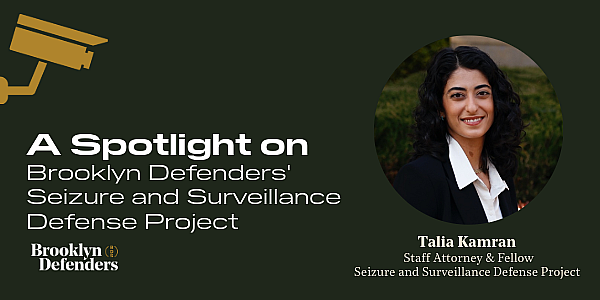A Spotlight on Brooklyn Defenders’ Seizure & Surveillance Defense Project

NYPD property seizure practices don’t just take New Yorkers’ belongings, they fuel surveillance, punishment, and racial injustice. In this Q&A, Talia Kamran, Staff Attorney & Fellow, breaks down how these practices disproportionately target Black and Brown New Yorkers and how our Seizure and Surveillance Defense Project is fighting back.
What makes this project so urgent and important right now? Why is this an issue that needs dedicated advocacy?
The NYPD’s property seizure practices have escalated into a systemic crisis, disproportionately targeting Black and Brown New Yorkers. Every day, the NYPD takes people's phones, cash, and essential belongings—often without any instructions or information about how to get them back—leaving them without crucial tools for work, communication, and daily life. Many are denied property vouchers, their property is mislabeled or lost, or it is unlawfully categorized in ways that prevent them from recovering it. As a result, phones, cash, vehicles, and other critical belongings disappear without due process, exacerbating the collateral consequences of criminal legal involvement and fueling economic instability.
This problem is particularly urgent now because the NYPD has dramatically increased its seizure of cell phones. Given the immense amount of personal data stored on phones and the NYPD’s expanding surveillance capabilities, the unnecessary or unlawful retention of these devices raises serious privacy and civil rights concerns. Once a phone is in police custody, its data—messages, location history, social media—can be accessed, extracted, and used against its owner or shared with other agencies, often without oversight.
Without a dedicated legal and advocacy response, police will continue to use property seizure as an unchecked tool of control, disproportionately harming marginalized communities. The legal system provides few protections against the prolonged retention of seized devices, enabling law enforcement to extract personal data, use it for prosecution, and share it with other state agencies. Advocacy is critical to challenging these practices through litigation, policy reform, and direct client representation—ensuring that people have the tools to reclaim their property and privacy.
What impact do you hope your work will have both for individual clients and in the broader fight against abusive policing and surveillance?
The property seizure issue is largely overlooked in the legal system. A dedicated team of property seizure experts with civil litigation background working closely with criminal defense attorneys is so critical, especially in cases of vehicle seizures under civil asset forfeiture. Without legal support, thousands of people—many of whom rely on their cars for work or their phones for daily survival—are left to navigate a convoluted, opaque process alone.
The bureaucratic hurdles are extreme. If property is marked for forfeiture or investigation, the retrieval process becomes nearly impossible without legal expertise. The city’s systems are designed to obstruct recovery rather than facilitate it, making dedicated advocacy essential to challenging these barriers and forcing accountability.
By doing property seizure work alongside our forensics team, which deals with the ways that digital searches and data extraction show up in criminal cases, we use our work to not only help people get their stuff back but also add another dimension to our anti-surveillance work. We work with forensics to evaluate, litigate, and engage in policy discussions about the necessary role property seizure plays in surveillance.
How does working within BDS uniquely position you to take on these challenges? What strengths or resources does the organization bring to this fight?
BDS is uniquely equipped to fight NYPD property seizure and surveillance because we are an interdisciplinary legal office. Our ability to see patterns across different units—criminal defense, civil defense, adolescent defense—gives us a broader understanding of how these seizures operate as part of a larger system of policing and information gathering. Our policy team works to create systemic solutions, ensuring our clients have a better chance at protecting their property and digital privacy in the future. BDS is also uniquely supportive of creative legal projects and ideas that provide crucial help to our client community.
Additionally, BDS’s expert forensics team help challenge the use of data extracted from unlawfully seized phones. By tracking patterns in digital forensics across cases, we inform our policy and litigation agenda. This allows us to fight on multiple fronts—direct legal representation, forensic investigation, and policy advocacy—to protect our clients’ privacy and property.
The NYPD’s property seizure practices disproportionately impact Black and Brown New Yorkers. How does your work address these systemic injustices, and what challenges do you face in pushing for accountability?
NYPD property seizures overwhelmingly target Black and Brown communities, reinforcing economic and racial inequality. Our work directly confronts these disparities by providing legal representation to those most impacted, documenting discriminatory enforcement patterns, and advocating for policy changes to limit police power. Holding the NYPD accountable remains a challenge—police departments resist transparency, and legal loopholes allow them to justify prolonged retention of property. Our efforts seek to close these gaps and demand real accountability.
Your unit deals with cases where the NYPD seizes personal property, often without legal justification. What are some of the most alarming patterns or trends you’ve observed in your work?
Through our work, we’ve identified troubling trends, including:
- Widespread phone seizures during street stops, often without legal justification—particularly from young clients.
- Prolonged retention periods, preventing retrieval for months or even years.
- Unwarranted data extraction, expanding police surveillance and criminalization.
- Coercive “consent” searches of devices.
- The permanent retention of data from these extractions by law enforcement agencies with no method to challenge such retention
- Prolonged retention of client’s property, especially cell phones, with no criminal case at all under the guise of an unspecified “criminal investigation.”
- Threats of violence, arrest or incarceration when clients demand the return or lawful retention of their property
- Clients’ property being frequently discarded or sold by the NYPD to pad their budget to the tune of millions of dollars without a legitimate opportunity to secure its return
These tactics not only violate individual rights but also expand law enforcement’s ability to surveil and criminalize entire communities.
